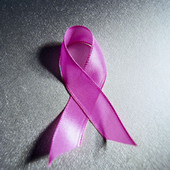Protein Linked With Poor Prognosis in Early-Stage Breast Cancer
But expression of Ki-67 didn't predict who'd benefit from additional chemo.
|
E-mail this article
Subscribe to news
Printer friendly version
|

(SOURCE: Journal of the National Cancer Institute, news release, Jan. 29, 2008)
WEDNESDAY, Jan. 30 (HealthDay News) -- High levels of a protein called Ki-67 are associated with poor prognosis in women with early-stage breast cancer, but this protein may not be useful in identifying patients who would benefit from additional chemotherapy, an Italian study suggests.
Some studies have suggested that breast tumors with a high percentage of tumors cells expressing Ki-67 are more responsive to chemotherapy. This study looked at whether Ki-67 levels predicted responsiveness to chemotherapy in women who'd had surgery for breast cancer.
Researchers at the University of Milan in Italy assessed Ki-67 expression in tumor samples from women in two randomized clinical trials comparing the use of endocrine therapy alone to endocrine therapy after chemotherapy.
They found that Ki-67 expression didn't predict which women would benefit from chemotherapy prior to endocrine therapy, but they did find that having a high percentage of tumor cells expressing Ki-67 was associated with poorer disease-free survival.
"In this study, Ki-67 [expression] was a prognostic factor, not a predictive factor," the study authors wrote.
The findings were published in the Jan. 29 issue of the Journal of the National Cancer Institute.
These results support the position of the American Society of Clinical Oncology Tumor Markers Expert Panel that Ki-67 shouldn't be used to make decisions about chemotherapy, Matthew Ellis, of Washington University in St. Louis, wrote in an accompanying editorial.
"Biomarker studies with negative results can be just as important to publish as those with positive results, because clinging to a long-favored but incorrect hypothesis in the face of negative evidence impedes scientific and clinical progress," Ellis wrote.
More information
Breastcancer.org has more about breast cancer treatment. 
Copyright © 2008 ScoutNews, LLC. All rights reserved. 
HealthDayNews articles are derived from various sources and do not reflect federal policy. healthfinder.gov does not endorse opinions, products, or services that may appear in news stories. For more information on health topics in the news, visit the healthfinder.gov health library.